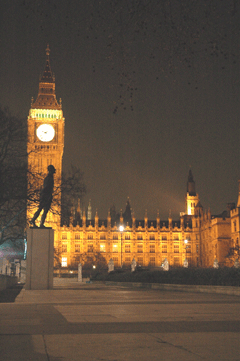Carbon Trading Gets Personal
Air Date: Week of March 7, 2008

If the UK opts for a carbon tax, the Houses of Parliament and Big Ben will face a bill for their flood lights. (Photo: Dan Grossman)
Some say that limiting industry’s greenhouse emissions isn’t enough; individuals need to be put on a cap and trade plan, too. Host Steve Curwood talks with Richard Starkey, a researcher with the Tyndall Centre for Climate Change Research in the UK, about a number of personal CO2 trading schemes, and the challenges to putting limits on people’s carbon emissions.
Transcript
CURWOOD: Big business generates a lot of climate changing gases, but then, so do individuals. In the UK, 40 percent of CO2 emissions come from ordinary citizens who are the end users of fossil fuels. So there are several proposals to give plain folks some direct incentives to reduce their carbon waste. One option is a carbon tax – you use more, you pay more. Another idea would be carbon allowances that people could sell if they didn’t use them. At the Tyndall Centre for Climate Change Research in England, Richard Starkey is working on a scheme called the Domestic Tradeable Quota. Each citizen would get a sort of carbon debit card that would record exactly how much fossil fuel they use for transport and in their home. Mr. Starkey joins me now from Manchester, England. Welcome to Living on Earth.
CURWOOD: This sounds a bit like Big Brother.
STARKEY: Well this is one of the objections that people make to this sort of idea. There would be this great big database, everybody would have an account in this database, and that the state would be able to know when you bought your gas, how much you bought, how much you paid. And obviously civil liberties in this country, as in the States, are very important. And so if a scheme like this was ever to be implemented, then there would have to be very stringent safeguards about how much data the government was able to collect on individuals and who was able to see that data. But I think you’re absolutely right, any scheme like this, if it’s going to work, has to be privacy friendly.
CURWOOD: So under your scheme I’d get something like what, a World War II ration card, that – I mean, I could trade that, right? If I didn’t want to use the emissions I could sell it to somebody else or give it to my cousin or something?

Richard Starkey from the Tyndall Centre for Climate Change Research in England. (Photo: Tyndall Centre for Climate Change Research in England)
STARKEY: Yeah that’s a really good point that you make. This would actually be very different from World War II rationing, because the rations that you got in the Second World War were non-tradable. But what you would be getting under this scheme is a tradable ration. So if you’re a low emitter, perhaps if you don’t drive very much, if you’ve got a very well insulated house, if you use efficient appliances, you’d have some spare emissions rights left. And so you could sell those on the national market to people who have higher emissions, and so who needed to buy higher emissions rights to emit at a higher level. And so that there would be a market in emissions rights, and so individuals would be carbon traders.
CURWOOD: A number of details to something like this. What about somebody who has, say, three kids as opposed to somebody who has no kids? And then they drive them to the soccer match and all that sort of thing. One adult, one set of emissions, doesn’t matter how many kids you have?
STARKEY: That’s a really good question you ask. I think for some people, the idea that every adult gets the same quantity of emissions rights is very appealing. But as you say, when you think about it first, some rather awkward questions keep coming up. Well, what happens if someone lives in a very cold part of the country where they need more fuel for heating? And if they need more fuel they produce more emissions. I think there are two ways of approaching it. Either you go for the commons argument and say, ‘well because we all share the atmosphere, everybody owns it equally, therefore everybody is entitled to emit equally.’ Perhaps the other argument you could make it, well look, if we had to adjust everybody’s allowance for everybody’s individual circumstances, then it would be horrifically complicated for government.
CURWOOD: How do these various schemes keep things equitable between poor people who don’t have a lot of money to pay for an extra carbon tax or emission right, and rich people, who certainly could well afford such a thing?
STARKEY: Generally speaking, poor people emit much less than rich people, so under this scheme everybody, if you like, gets an average quantity of emissions rights. But generally speaking, less well-off people emit at a below average level, whereas more well-off people emit at an above average level. So if you like, it’s a scheme that’s friendly to those on lower incomes.
CURWOOD: As long as they don’t have to drive very far to get to that poor-paying job.

If the UK opts for a carbon tax, the Houses of Parliament and Big Ben will face a bill for their flood lights. (Photo: Dan Grossman)
CURWOOD: Richard Starkey is a research fellow with the Tyndall Centre at the University of Manchester in England. Thank you so much, Mr. Starkey.
STARKEY: It’s a real pleasure.
CURWOOD: Happy driving. I hope you have the quotas for it.
STARKEY: [laughs] Thank you very much.
Links
Living on Earth wants to hear from you!
Living on Earth
62 Calef Highway, Suite 212
Lee, NH 03861
Telephone: 617-287-4121
E-mail: comments@loe.org
Newsletter [Click here]
Donate to Living on Earth!
Living on Earth is an independent media program and relies entirely on contributions from listeners and institutions supporting public service. Please donate now to preserve an independent environmental voice.
NewsletterLiving on Earth offers a weekly delivery of the show's rundown to your mailbox. Sign up for our newsletter today!
 Sailors For The Sea: Be the change you want to sea.
Sailors For The Sea: Be the change you want to sea.
 The Grantham Foundation for the Protection of the Environment: Committed to protecting and improving the health of the global environment.
The Grantham Foundation for the Protection of the Environment: Committed to protecting and improving the health of the global environment.
 Contribute to Living on Earth and receive, as our gift to you, an archival print of one of Mark Seth Lender's extraordinary wildlife photographs. Follow the link to see Mark's current collection of photographs.
Contribute to Living on Earth and receive, as our gift to you, an archival print of one of Mark Seth Lender's extraordinary wildlife photographs. Follow the link to see Mark's current collection of photographs.
 Buy a signed copy of Mark Seth Lender's book Smeagull the Seagull & support Living on Earth
Buy a signed copy of Mark Seth Lender's book Smeagull the Seagull & support Living on Earth

